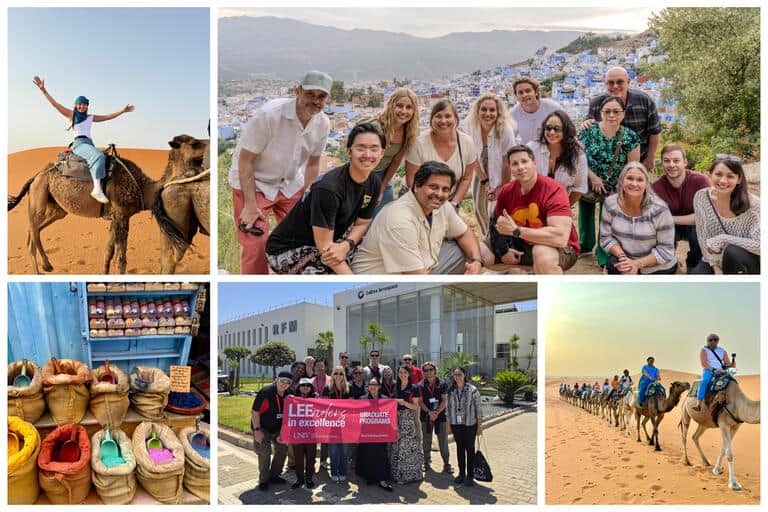Business Lessons from Morocco: Insights for Students at the University of Nevada, Las Vegas


International experiential learning opportunities provide students with invaluable insights into how business operates across different cultural contexts. At the University of Nevada, Las Vegas (UNLV), students from the Lee Business School actively engage in global seminars that challenge their perceptions and expand their understanding of international commerce. One particularly impactful program took students on a 10-day journey through Morocco, offering a firsthand look at the unique business landscape in North Africa. This article explores the key lessons gleaned from their trip and how such experiences can benefit aspiring business professionals worldwide.
Understanding the Market Means Understanding the Culture
Successful international business hinges on a deep understanding of local culture and social norms. During their trip to Morocco, UNLV students visited iconic sites like the Hassan II Mosque and the Mausoleum of Mohammed V, which provided insights into the country’s spiritual and political identity. Beyond sightseeing, students learned that many aspects of Moroccan business are rooted in relationships and community rather than rigid regulations.
Ajay Nune, a participating student, highlighted that exploring informal marketplaces, such as the old medina in Rabat, revealed the efficiency and human-centered nature of Moroccan commerce. Vendors and artisans work shoulder to shoulder, emphasizing trust and connection over aggressive competition. This teaches future entrepreneurs and business leaders the importance of cultivating personal relationships and understanding local customs when entering foreign markets.
Agility Matters
Morocco’s bustling markets and historic cities offer a vivid illustration of flexibility’s role in sustainable commerce. In Fez, students faced sensory overload in the medina’s winding alleys, crowded with vendors shouting and bargaining. Such chaos can seem overwhelming initially but underlines the importance of adaptability—an essential trait in an unpredictable, dynamic environment.
Later, a trip to the Sahara Desert provided a contrasting experience: moments of stillness and patience, where walking camels through dunes prompted reflection on the need for slowing down amid rapid changes. Students recognized that businesses must be flexible to navigate challenges, whether it’s adapting to local customs or responding to market fluctuations.
The Business of Making People Feel at Home
In the Blue City of Chefchaouen, the vibrant blue walls and shared community efforts exemplify how culture influences business atmosphere. The collective effort reflected in the city’s aesthetic conveys a sense of identity and belonging, fostering hospitality and openness.
Similarly, a traditional Moroccan tagine cooking class with local hosts deepened students’ understanding that genuine warmth, trust, and shared experiences are fundamental to successful business relationships. Such personalized, culturally aware interactions create lasting connections that often transcend transactional exchanges.
Entrepreneurship Is Everyday Hustle
Moroccan markets showcase entrepreneurship rooted in tradition, craftsmanship, and community resilience. Students observed street vendors, artisans, and shopkeepers operating daily routines that sustain their livelihoods. These informal microenterprises rely on reputation, personalized service, and sustainability—principles equally relevant in today’s global economy.
This perspective underscores that entrepreneurship need not be solely high-tech or high-growth; it can be practical, community-oriented, and sustainable. The Moroccan approach emphasizes sourcing locally, waste minimization, and building long-term customer relationships, valuable lessons for students aiming to implement environmentally and socially responsible practices in their future careers.
Culture Shapes Business from the Inside Out
Throughout the journey, from the old streets of Chefchaouen to the ancient walls of Aït Ben Haddou, the recurring theme was that culture deeply influences how people work, communicate, and collaborate. Building relationships and understanding local customs are not just add-ons but essential elements of business strategy.
Engaging with Moroccan families during a tagine cooking class allowed students to see that business often revolves around reputation, care, and consistency. These personal touchpoints foster trust and loyalty, which are crucial for long-term success.
Applying Global Lessons to Local Contexts
Experiential learning trips like the one to Morocco serve as catalysts for broader understanding and skills development. For students at the University of Nevada, Las Vegas, such international exposure is integral to their education—preparing them to operate confidently in diverse cultural environments.
By embracing cultural intelligence and adaptability, future business leaders can develop strategies that respect local customs while achieving their organizational goals. These lessons demonstrate that effective global business requires more than technical knowledge; it demands empathy, relationship-building, and a nuanced understanding of local dynamics.
Why International Experience Matters
The trip to Morocco exemplifies how experiential international learning can transform perspectives and equip students with essential business lessons. From understanding local cultures and building trust to adapting quickly and recognizing the value of community, these lessons lay a foundation for effective global business practices.
For students at the University of Nevada, Las Vegas and beyond, embracing such experiences offers a pathway to becoming more culturally competent, adaptable, and successful in navigating the complexities of international markets. Whether in Morocco or at home, these insights reinforce that understanding people and relationships is at the heart of sustainable business success.
Take the Next Step Toward Studying at UNLV!
Ready to join a vibrant, supportive, and world-class university where students come first? At UNLV, you’ll benefit from a diverse global community, personalized academic advising, career guidance, research opportunities, and a dynamic campus life that prepares you for success in your future career and beyond.
Fill out the form now to get personalized assistance from an expert!

